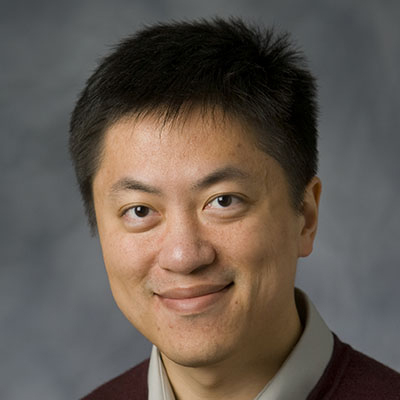Jun Yang named Chair of Duke Computer Science
Jun Yang has been named chair of Duke Computer Science, effective July 1, 2020. Yang, Bishop-MacDermott Family Professor at Duke, has been with the department since 2001 and served as associate chair from 2017-2020.
Yang assumes the position from outgoing chair Pankaj Agarwal. In an email to faculty and staff, Yang thanked Agarwal for his service.
“We will have more opportunities later to thank Pankaj for his visionary leadership and tireless service as chair in the past three years, but for now let me give him a big shout-out of gratitude,” Yang said. “He has led us through many tough challenges, and our department has made exceptional strides under his wing.”
Yang is stepping into the position amid rapidly changing circumstances on and off campus. Speaking via Zoom from his home office, Yang said he hopes to maintain the trajectory and momentum of the department as the university transitions into a new era.
“Computer Science is the number one major at Duke right now,” Yang said. “COVID-19 can and will change a lot of things. But computer science will continue to be important in many, many areas.”
Yang said that Duke CS is uniquely positioned among the university’s various departments for the simple reason that computing underlies virtually every endeavor on campus and in society at large.
“We hope to play a significant role, not just in computer science, but across all disciplines.” Yang said.
To that end, Yang hopes to leverage insights from his own research interests in the area of database and data-intensive computing. Yang currently co-directs the Duke Database Research Group and his research has been supported by a wide range of public and private institutions, including the National Science Foundation, the National Institutes of Health, the Knight Foundation, IBM, Amazon and Google.
Among Yang’s many rolling projects is his initiative on Computational Journalism, and specifically how data and computation can help fight misinformation online and in the media. Working with Bill Adair, director of the DeWitt Wallace Center for Media and Democracy at Duke and founder of the influential online resource PolitiFact, Yang is helping develop data-driven systems to fact-check not only claims that are outright wrong but also those that manipulate data to mislead. This effort has been an ongoing collaboration for many years with computer scientists, social scientists, and journalists across academia and industry.
“Many of my recent projects are really collaborative projects with those outside my research area, both inside and outside computer science,” Yang says. “That's where my passion and interest has been: to really figure out what data can do for people, not just studying data for data's sake.”
Yang said he also hopes to advance computer science towards another of Duke University’s core values – diversity. As an academic discipline, computer science has a notoriously dodgy reputation for gender imbalance. While departmental introductory classes are now running at around 50-50 gender balance, Yang said, females are underrepresented at higher levels.
“I think there's a lot more we can do at the advanced undergraduate and graduate levels and also with faculty recruiting to help diversity,” Yang says. “And it’s not just gender balance – it’s also the representation of racial and ethnic minorities. We’re far from where we’re happy about.”
But Yang is convinced that, in this time of radical transformation on the campus and in the world, enduring change is possible. In fact, he’s deeply committed to the idea that computer science can make a real difference.
“Our society has become so polarized across ideological divides and different backgrounds,” Yang said. “But there are things we can do as citizens and as computer scientists. We can build new platforms for a culture where we really listen to each other.”
The numbers suggest that there is plenty of raw material to work with. Last year, Duke CS graduated more than 350 majors, and enrollment in CS courses exceeded 3,700.
“I see the importance of computing not just in terms of student interest and education, but in making the inquiries we need to move society forward,” Yang said.
“I strongly believe we can leverage this opportunity at Duke to make us something larger than a computer science department.”





